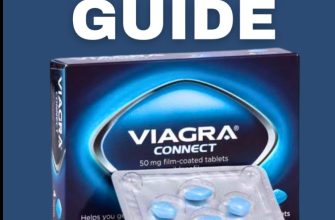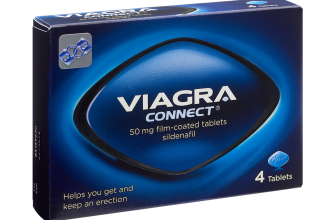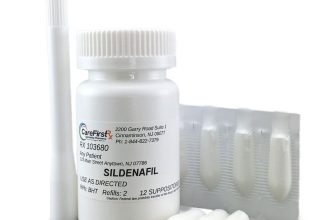Facing rising Viagra costs? Consider exploring generic alternatives like sildenafil. They offer the same active ingredient at significantly lower prices, often saving you 50% or more compared to brand-name Viagra.
Price fluctuations depend on several factors: pharmacy, insurance coverage, and quantity purchased. Large chain pharmacies may offer slightly lower prices than smaller, independent ones. Check with your insurance provider to see what your co-pay would be. Purchasing larger quantities usually results in per-pill cost savings.
Don’t hesitate to discuss cost-effective options with your doctor. They can provide valuable insights into affordable treatment choices, including exploring alternative medications or adjusting your dosage to reduce overall expenses. Remember, numerous resources exist to help navigate medication costs; researching online discount programs or patient assistance programs may yield substantial savings.
Comparing prices across multiple pharmacies is crucial. Utilize online pharmacy comparison tools, but always verify the legitimacy of any online pharmacy before ordering. Ensure the site has appropriate security measures and is licensed to dispense medication in your area. Prioritizing your health and safety should always guide your purchasing decisions.
- Viagra Cost Increase: A Detailed Analysis
- Current Viagra Prices and Variations
- Factors Contributing to the Rising Cost of Viagra
- Generic Alternatives and Their Pricing
- Impact of Insurance Coverage on Viagra Costs
- Strategies for Reducing Viagra Expenses
- Negotiating Costs
- Exploring Alternatives
- The Future of Viagra Pricing and Accessibility
- Factors Influencing Future Costs
- Improving Accessibility
- Potential Developments
- Potential Legal and Regulatory Implications
- Antitrust Concerns
- Consumer Protection Laws
- Government Price Controls
- Impact on Healthcare Spending
- Key Regulatory Bodies and Their Roles
- Transparency Requirements
Viagra Cost Increase: A Detailed Analysis
Pfizer, Viagra’s manufacturer, cites rising production and distribution costs as the primary driver behind recent price hikes. These increases vary depending on dosage and supplier, but average around 5-10% annually in many markets.
Generic alternatives, such as sildenafil citrate, offer a significantly cheaper option. Their prices are generally 50-80% lower than brand-name Viagra, providing substantial cost savings for consumers. Consider switching to a generic to reduce medication expenses.
Prescription drug insurance plans vary greatly in their coverage. Check your specific policy details for information on Viagra or sildenafil coverage, co-pays, and any limitations on quantity. Comparing different insurance plans before choosing a policy can yield considerable savings.
Online pharmacies may offer lower prices compared to brick-and-mortar stores. However, exercise caution. Only purchase medication from licensed and reputable online pharmacies to ensure medication safety and authenticity. Verify their licensing and customer reviews before making a purchase.
Negotiating price directly with your pharmacist can sometimes prove fruitful. They may have access to manufacturer coupons or programs that can lower your out-of-pocket costs. Don’t hesitate to ask about available discounts.
Several factors influence Viagra’s price fluctuations, including raw material costs, manufacturing processes, and market competition. Understanding these factors helps you make informed decisions regarding your medication costs.
Always consult your doctor before switching medications or making changes to your treatment plan.
Disclaimer: This information is for educational purposes only and does not constitute medical advice. Always consult a healthcare professional for any health concerns.
Current Viagra Prices and Variations
Finding the best price for Viagra requires research, as costs vary significantly. Generic sildenafil, the active ingredient in Viagra, is considerably cheaper than the brand name. Expect to pay between $20 and $50 for a month’s supply of generic sildenafil, depending on dosage and pharmacy.
Brand-name Viagra prices are generally higher. Costs can range from $50 to over $100 per month. These prices are subject to change based on your location, insurance coverage, and the pharmacy you choose.
- Insurance Coverage: Check your insurance plan. Many plans cover generic sildenafil, significantly reducing out-of-pocket costs. Brand-name coverage varies widely.
- Pharmacy Discounts: Utilize pharmacy discount cards or coupons. Many pharmacies offer these, potentially lowering your bill. Compare prices between different chains or online pharmacies.
- Online Pharmacies: Exercise caution. Be sure the online pharmacy is licensed and legitimate. Verify their authenticity before making a purchase.
- Dosage: Higher dosages of both brand-name and generic Viagra usually cost more.
To find the lowest price in your area:
- Contact your insurance provider: Inquire about coverage and preferred pharmacies.
- Visit multiple pharmacies: Compare prices in person at various local pharmacies.
- Use online pharmacy price comparison tools: Several websites allow you to compare prices from different online pharmacies. However, always validate their legitimacy.
Remember to consult your doctor before purchasing Viagra or any medication for erectile dysfunction. They can help determine the appropriate dosage and address any potential health concerns.
Factors Contributing to the Rising Cost of Viagra
Increased manufacturing and distribution costs significantly impact Viagra’s price. Pfizer, the original manufacturer, faces rising expenses for raw materials, labor, and transportation. These increases directly translate to higher drug prices.
Patent expiration doesn’t always mean lower prices. While generic versions exist, they sometimes don’t immediately drive down the cost of the brand-name drug. Competition from generics is theoretically beneficial, yet the market dynamics often limit immediate price reductions.
Marketing and advertising campaigns contribute to the overall cost. Pfizer continues to invest heavily in promoting Viagra, and these costs are ultimately passed on to consumers through higher prices.
Research and development of new erectile dysfunction medications influences the market. The ongoing investment in researching and developing new treatments impacts pricing across the entire class of drugs.
Government regulations and healthcare policies play a role. Changing regulations and pricing policies in different countries influence the price of Viagra, sometimes independently of manufacturing costs.
Increased demand also affects price. Consistent high demand for Viagra, particularly among an aging population, contributes to the upward pricing pressure.
Generic Alternatives and Their Pricing
Consider sildenafil, the generic version of Viagra. You’ll find significant cost savings. A 100mg tablet of brand-name Viagra can cost upwards of $70, while a comparable sildenafil tablet frequently sells for under $20. This difference is substantial.
Tadalafil, the generic equivalent of Cialis, provides another budget-friendly option. While prices vary by pharmacy and dosage, expect to pay considerably less than the brand-name equivalent, often half the cost or less. This makes it a very attractive alternative.
Always check with your doctor before switching medications. They can advise on suitable dosages and potential interactions. Pharmacy comparison websites can help you find the best prices for generic medications in your area. Many online pharmacies also offer competitive pricing. Carefully review any online pharmacy’s legitimacy before making a purchase.
Remember: Generic medications undergo rigorous testing to ensure they meet the same quality and efficacy standards as brand-name drugs. They contain the same active ingredient and are just as effective.
Exploring generic options allows you to maintain treatment without the higher price tag of brand-name drugs. This can save you a considerable amount of money over time.
Impact of Insurance Coverage on Viagra Costs
Check your insurance plan’s formulary. Many plans cover Viagra, but coverage varies widely. Some plans require pre-authorization, impacting access and potentially delaying treatment. Others might place Viagra in a higher cost-sharing tier, leading to significant out-of-pocket expenses for patients.
Negotiate with your provider or explore alternative plans. Contact your insurer directly to discuss coverage specifics. If your current plan doesn’t offer favorable coverage, consider switching to a plan with better benefits. Explore different tiers within your current insurer’s offerings or investigate other insurance providers available in your area.
Consider generic alternatives. Sildenafil, the generic version of Viagra, is significantly cheaper. Your doctor can discuss the suitability of switching to a generic medication. Generic sildenafil provides the same active ingredient at a lower cost, often covered at a lower cost-sharing tier under insurance plans.
Explore patient assistance programs. Pharmaceutical companies often offer programs to help patients afford medications. These programs may provide discounts or free medication to eligible individuals based on income and other factors. Check the manufacturer’s website for details on availability and eligibility requirements.
Compare prices at multiple pharmacies. Prices can vary between pharmacies, even for medications covered by insurance. Use online pharmacy comparison tools or call local pharmacies to compare the final cost after insurance discounts.
Remember: Always consult your doctor before starting or changing medications. This information is for guidance only, not medical advice.
Strategies for Reducing Viagra Expenses
Explore generic options. Sildenafil, the active ingredient in Viagra, is available as a generic medication at significantly lower prices. Consider purchasing a 90-day supply; pharmacies often offer discounts for larger quantities.
Negotiating Costs
Discuss pricing with your doctor or pharmacist. They may be able to suggest cheaper alternatives or connect you with patient assistance programs. Check if your insurance plan covers Viagra or generic sildenafil; many plans offer varying levels of coverage, sometimes requiring pre-authorization.
Consider online pharmacies. Reputable online pharmacies often offer competitive pricing, but exercise caution and verify their legitimacy with your doctor before ordering. Compare prices from several trusted online pharmacies to find the best deal. Be aware of potential shipping costs.
Exploring Alternatives
Talk to your doctor about alternative treatments. Other medications for erectile dysfunction may be more affordable. Lifestyle changes, such as diet and exercise, can also positively impact erectile function and reduce the need for medication.
The Future of Viagra Pricing and Accessibility
Expect increased competition from generic versions. This should gradually lower prices for many consumers. However, patent expirations vary by country, impacting accessibility differently across the globe.
Factors Influencing Future Costs
- Generic Competition: The timeline for generic entry significantly affects pricing. More generic options mean lower costs.
- Manufacturing Costs: Fluctuations in raw material prices and manufacturing processes influence the final product cost.
- Regulatory Changes: Government policies and healthcare regulations can directly impact drug pricing and accessibility.
- Research and Development: Investment in new treatments for erectile dysfunction may indirectly affect Viagra pricing.
Consumers should actively compare prices from various pharmacies and online providers.
Improving Accessibility
- Increased Transparency: Greater price transparency will empower consumers to make informed choices. Government initiatives promoting price comparisons could be beneficial.
- Affordable Healthcare Initiatives: Government subsidies or insurance coverage expansions can significantly improve accessibility for those with limited financial resources.
- Telemedicine: Online consultations and prescription services can broaden access, particularly for patients in remote areas.
Pharmaceutical companies might develop alternative pricing models to enhance affordability, such as tiered pricing based on income.
Potential Developments
- New ED Treatments: The introduction of new medications may influence Viagra’s market share and pricing.
- Alternative Therapies: Growing interest in alternative treatments for erectile dysfunction might shift market dynamics and pricing pressures.
Regularly review your healthcare options and stay informed about pricing changes to ensure optimal cost-effectiveness and accessibility.
Potential Legal and Regulatory Implications
Pharmaceutical price increases, like those seen with Viagra, frequently trigger scrutiny from regulatory bodies and may lead to legal challenges. The Federal Trade Commission (FTC) and the Department of Justice (DOJ) actively monitor drug pricing for anti-competitive practices, such as price gouging or collusion among manufacturers. Significant price hikes might prompt investigations to ensure fair market competition.
Antitrust Concerns
If evidence suggests collusion between Pfizer (Viagra’s manufacturer) and other pharmaceutical companies to artificially inflate prices, antitrust laws could be invoked. Penalties could include substantial fines and even legal injunctions limiting price increases. Private lawsuits from consumers or insurers alleging price fixing are also possible.
Consumer Protection Laws
State-level consumer protection laws might offer additional legal avenues for redress if price increases are deemed unfair or deceptive. These laws often require manufacturers to justify price hikes based on legitimate cost increases or market factors. Failure to provide adequate justification could result in legal action.
Government Price Controls
Although less common in the US for brand-name drugs, government price controls remain a possibility. Extreme price increases could pressure policymakers to consider regulations limiting the price of essential medications, potentially impacting Viagra’s market dynamics.
Impact on Healthcare Spending
The increased cost of Viagra directly affects healthcare expenditures, both publicly and privately. This could lead to debates on healthcare affordability, potentially influencing policy decisions related to prescription drug coverage and reimbursement rates. Increased costs might also shift patients towards generic alternatives if available.
Key Regulatory Bodies and Their Roles
| Agency | Role in Viagra Price Increase Scrutiny |
|---|---|
| Federal Trade Commission (FTC) | Investigates potential anti-competitive practices affecting drug pricing. |
| Department of Justice (DOJ) | Enforces antitrust laws, potentially pursuing legal action against companies engaging in price fixing. |
| Food and Drug Administration (FDA) | While not directly involved in price regulation, the FDA’s approval process and patent expirations indirectly influence Viagra’s market position and the availability of generics. |
| State Attorneys General | Can pursue legal action under state consumer protection laws if price increases are considered unfair or deceptive. |
Transparency Requirements
Increased regulatory pressure could result in greater transparency requirements for pharmaceutical companies regarding pricing decisions. This may involve more detailed reporting on manufacturing costs, research and development expenses, and marketing expenditures to substantiate price adjustments.










